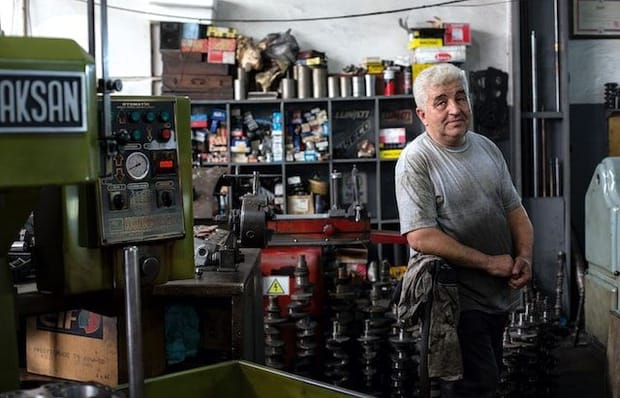This blog series stems from company-wide conversations around International Women’s Day, and the role that we play as a tech company. Like many, we’re cautious of appearing tokenistic or inauthentic — which is where only talking about ‘Women in Tech’ on one day of the year comes into play.
As an employer, we’re obviously aware of our role and responsibilities but, as content creators, we also believe that we can meaningfully add to the dialogue and challenge accepted norms. We want to inspire a new generation of women and people to get into tech, and to regard it as a possible and viable career. For that to happen, we need to be talking about it regularly. This blog series is one of the ways we can do that.
Our aim is to be honest, open and challenging — to look at the sector, and the inequalities and opportunities within it, constructively and to suggest solutions where possible.
We felt that the best place to start is with the women who work in technical roles at RotaCloud. Though arguably it could be said that any of us (including me) work in tech, we want to address the sphere where gender inequality is more prevalent. For this introductory article, we’ve spoken with women who work in web development, mobile development and software testing.
NOTE: To stay true to voice, tone and experience, we’ve kept to a standard Q&A interview style and, because each of our interviewees wants to be known and valued for the work they do (rather than being defined by their gender), we’ve removed their names and used their job titles instead.
2. What sort of roles are available in the tech sector?
3. What’s the sector currently like for women?
4. Do you think of yourself as a ‘Woman in Tech’
5. What’s your experience of working in the sector
6. What role do men need to play in the conversation around ‘women in tech’?
1. In your own words, can you describe the tech sector?
Back-end Developer - Companies and businesses that provide internet services, platforms, and hardware equipment. And the organisations that heavily rely on tech.
Mobile Developer - People who develop products that make people's lives easier (and improve their quality of life by automating manual work processes).
Front-end Developer - Everything from freelance web design agencies to big SaaS (Software as a Service) companies, to manufacturers of microchips.
Software Tester - The tech sector isn’t just companies that build websites and apps. In the modern world, every company needs an IT department and tech support. All of these are part of tech, even though they’re also part of another sector — whether that’s retail or healthcare. Tech is everywhere: it’s essentially every sector.

2. What sort of roles are available in the tech sector?
Back-end Developer - It depends on the nature of the business and its size. At any ‘tech company’ you’d find comparable job roles to those at most other businesses of a similar size.
Software Tester - Roles can be very technical (like development and testing), to more business-focused (like project management). A lot of roles have elements of both — like design or analytics.
All - Some of the most popular and recognised roles are:
- DevOps engineer (the bridge between development and operations to make the process of development and deployment (putting new code live) faster)
- Infrastructure engineer
- Front-end developer (builds and maintains all the ‘pretty’ things that user can see and interact with, generally anything user-facing)
- Back-end developer (builds and maintains all the smart things the user can’t see, like databases)
- Full-stack developer (all of the above, and more)
- Database administrator/engineer
- Data scientist/analyst (getting the right data out of a database, tidying it up, analysing it, testing hypotheses and drawing conclusions)
- Cloud engineer (designs, builds and maintains cloud infrastructure)
- User interface (UI) designer/User experience (UX) designer (gathers information about how people use something, then designs elements of the software to make the experience user-friendly)
- UX writer (writes for apps, websites and digital products)
- Marketing, including content/copywriter (everything that has to do with promoting the product)
- Mobile developer (builds software for mobile platforms such as Android or iOS)
- Software tester (makes sure that the code written by developers is working properly, by checking every possible scenario on websites, apps and databases)
- Scrum master/project manager/sales/customer support and product education roles
3. What’s the sector currently like for women? (And do you have any thoughts on why that might be?)
Back-end Developer - I think it is slowly changing. There are many more opportunities for women to get into tech, especially in the UK. I’m not up to date with what’s happening in my home country (Italy), but I strongly doubt they are progressing at the same speed as we are here.
There are opportunities like scholarships, and attending boot camps or conferences (which is what I did when I first started learning to code). There is still a lot to do, but I hope we are going in the right direction!
Mobile Developer - I think the tech sector is as welcoming to women as it is to men. As long as you work well, it doesn't matter if you're a man or a woman. The only problem with this industry is that there are far fewer women in it than men.
A reason for this may be that there are few female role models in the family or the social networks of girls and young women who might choose this career, and because of that they’re not aware that tech jobs are an option for them.
Front-end Developer - Mixed. As a female developer, I often feel outnumbered, but this probably goes back to education and cultural influences when ‘techy’ jobs were seen as more male pursuits — even though back in the 1960s, 50% of programmers were women!
I think there are still biases in the system that favour male developers, like very hard skill-focused recruitment processes, even though soft skills are extremely useful for developers. The ‘tech bro’ stereotype is still a thing in some start-ups — and in the media, of course.
Generally things are improving. From my perspective it’s been great to see loads of brilliant female developers becoming very influential on social media — Sarah Drasner and Sara Souedian, for example. And I am optimistic that numbers will start to even out a bit over the coming decades.
Software Tester - It’s definitely male-dominated, but that doesn’t necessarily mean it’s hostile or unpleasant. It really depends on the company culture - some are great, some are not so great.
4. Do you think of yourself as a ‘Woman in Tech’?
Back-end Developer - In all honesty, I have mixed feelings about being called a ‘woman in tech’. To me, it can feel like: ‘You're a woman who managed to get into tech and is now somehow in a world where you originally didn’t belong’.
I guess it depends on the context. For example, there’s a local meetup in my city called ‘Women in Tech’, which offers the opportunity for networking, better understanding of the tech industry, and tackles important topics like imposter syndrome and mental health. It makes absolute sense for the group to be called this, as it gives us a sense of belonging and community. But as an individual, I am a developer — period!
Mobile Developer - Not necessarily. I don't see myself as a ‘woman in tech’, but rather as someone who wants to be the best version of herself at the job she does.
I don't like the term because, from my point of view, it creates separation and an immediate comparison between women and men. Men have the historical advantage when it comes to work and, because of this, have been considered better suited to certain jobs. However, the times have changed and women and men should now have equal opportunities, so I don't think there needs to be this separation of terms.
Front-end Developer - Not day to day! I think maybe I would if I was the sole female dev in a bigger team with a more laddish culture, but my current team set-up means I don’t really identify with ‘women in tech’ (WIT) as a label. I certainly don’t mind being called one though.
I think WIT is helpful as a term to an extent, but may still make us sound (and perhaps feel) like outsiders.
Outside of women, tech also has a diversity problem — I’m privileged in that I’m white, straight, cis, and from a rich country. A female developer who is black, trans, and/or from a developing country faces a whole different level of challenges. So we need to make sure there’s room to talk about the other kinds of diversity problems tech has, too.
Software Tester - I am both female and working in a tech role, so I’m a woman in tech. But I feel pretty uncomfortable when the term is used like it’s my job title. I don’t mind sometimes calling myself that for outreach, or to discuss gender issues, but I’d prefer to just be a software tester, with no gender necessary.

5. What’s your experience of working in the sector?
Back-end Developer - I landed my very first job in the tech sector over two years ago, when I joined RotaCloud, and it’s safe to say I haven’t experienced injustices or discriminations. I’ve been given learning opportunities all along — especially the opportunity to move from a front-end to a back-end role (the latter being an even more male dominated arena). I was treated fairly and went through the standard hiring process (including a tech test and an interview), which gave me the chance to also prove to myself that I could do the job.
Mobile Developer - My experience in this field has always been a positive one, except that there’s never a balance between the number of women and men in a team. Even if it doesn't strictly bother me, I'd love to see more women on the team. I have always been the only woman, or occasionally one of two women, in teams of about 10-15 people.
Front-end Developer - I find it kind of strange to talk about! Overall, I don’t think I’ve experienced any active discrimination, but perhaps I’ve faced some unconscious bias or assumptions — and I’ve definitely experienced impostor syndrome. And not just in my developer role, but when I worked in non-developer roles too.
I guess there were a few situations where my gender might have entered into it:
- I didn’t push hard enough to move into a developer role, because I assumed I wasn’t ready
- I would never have thought that I was ready to be promoted to a non-junior developer role, but my manager was certain I was
- I would create documents to organise work because I knew it would help the wider team, but it was rare that anyone would more than glance at them, let alone reference or update them. Was I not assertive enough, or is organisation just not seen as that important in this sector?
- Team events would often be traditionally ‘male’ (go karting, air rifles, axe throwing etc.) because that’s what appealed to the majority, rather than more gender neutral activities (art, escape rooms, cooking classes, book clubs etc.). It’s not a massive issue, but does make you feel a bit invisible.
But there are also positives:
- I think the work I do as a developer is reviewed and judged on its own merits
- I was taken seriously when I said I wanted to switch careers
- I was promoted quickly to a role that reflected the work I was doing
- The majority of people I’ve worked with have the same curiosity and willingness to learn and grow.
So yeah, mixed! But definitely no overt discrimination or anything like that.
Software Tester - I’ve worked in three different companies, which were all very different. I’ve had the ups and downs you’d expect in any job, but never related to my gender. I guess the word I’d use to sum it up is ‘varied’.
6. What role do men need to play in the conversation around ‘women in tech’?
Back-end Developer - To tackle the gender wage gap.
Mobile Developer - To hire more women! Because of the gender imbalance, most tech job interviews are likely to be conducted by men, so they could take more women's job applications into consideration when hiring.
Front-end Developer - Generally, be supportive and don’t make it about you. Day-to-day, it would be great to see:
- Recruitment that encourages people with soft skills. Being a developer is only 20% about coding — the rest is a mix of organisation, administration, teamwork, problem-solving, researching, communicating outside of our sphere (with non-developers and clients), and so on. It would be so positive to see it recognised that good developers are multi-skilled, and that knowledge of a specific programming language is just one part of it.
- More learning. If you’re a manager or senior leader and you’re not hiring many women, or they don’t seem to stick around very long, find out why. There’s probably a reason for it! Give your employees a place to anonymously share feedback on the working environment and/or the recruitment process.
- Sharing the load. Offer to take notes at meetings if you’re capable of doing it. This is one task that often falls to women for no good reason (a pet peeve of mine).
Software Tester - I think they just need to listen and understand. I think that the desire to play a more active role is admirable, but they need to listen first.
7. Is there anything you’d like to add (opportunities, division of labour, any misconceptions or preconceptions that exist)?
Back-end Developer - Girls need to be incentivised and encouraged to start a career in tech, and they also need to know it’s ok if they like video games or mathematics, instead of being told ‘Oh no, that’s a boy thing’. As an example, when I was a little girl I used to dream of having a workbench with tools to build stuff. I got a toy kitchen instead, of course.
Another big problem is recruitment. All you see in job descriptions is a stack (a stack is a technology set that developers use to build and run applications and, generally, people apply for jobs that advertise the stack they’re proficient in), and this defines you as a developer. In a sense, you are already excluding women from applying, because:
- It doesn’t acknowledge the soft skills that are hugely important and valuable for developers (communicating - both verbal and written, mentorship and teamwork, problem solving and critical thinking, time management etc.).
- Those who have chosen to be mothers and have a career are unlikely to have the time for learning new technology outside of work, but these can definitely be acquired on the job.
Front-end Developer -
- Life for women in tech varies hugely depending on company culture.
- A lack of women in leadership roles is probably the root cause of the cultural issues.
- Traditionally, ‘female’ skills aren’t valued as much as traditionally ‘male’ skills.
- As a woman, it’s therefore assumed that you are good at the traditionally ‘female’ skills (organisation, resolving conflicts, educating), and bad at the ‘male’ ones (making decisions, anything technical or involving numbers). So much of this goes back to education and our wider culture, but we can (all of us) challenge these assumptions at work and in our day-to-day lives.
Software Tester - I think that to some people ‘The Tech Sector’ is this big, important, magical place, when in reality it’s just a job, with pros and cons like any other. Tech gets a lot of attention, but in reality it needs to function fairly like any other sector. It’s not somehow above that.
Next up in our Women in Tech series, we’ll explore the different ways that women can get into the sector and what a career in it can look like.
If you have experience or comments that you’d like to share in response to this article, or ideas for future blogs in the series, please get in touch via LinkedIn and Twitter. Help us to continue the conversation by sharing this article with your professional networks on your own social media.





